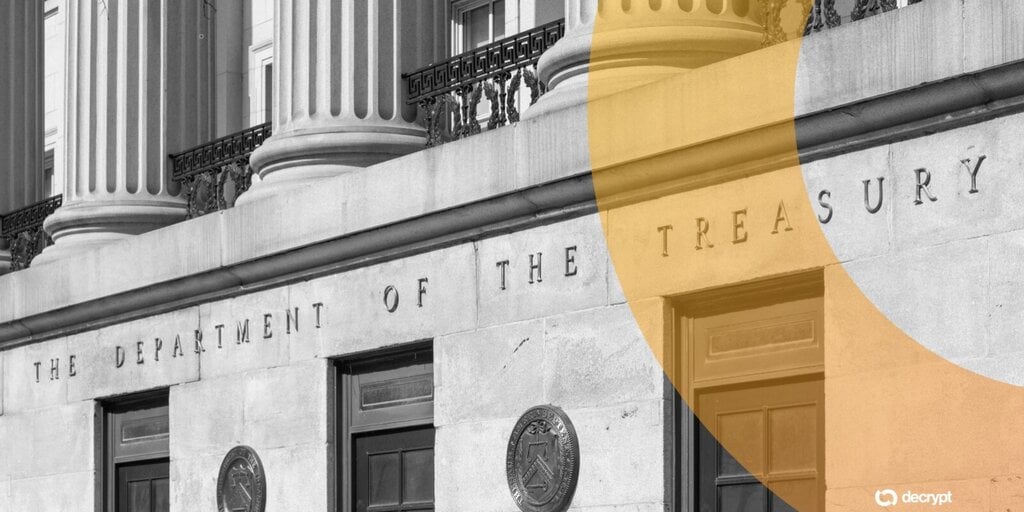In brief
- OFAC has sanctioned two Iranians and multiple firms in Hong Kong and the UAE.
- The designations hit a shadow banking network tied to oil sales and cryptocurrency transactions for the IRGC-QF and MODAFL.
- The measures follow Israeli moves against 187 crypto wallets linked to the IRGC.
The U.S. Treasury Department has imposed sanctions on two Iranian nationals and a slate of Hong Kong and United Arab Emirates-based companies accused of funneling money from illicit oil sales to Iran’s Islamic Revolutionary Guard Corps-Quds Force (IRGC-QF) and Ministry of Defense and Armed Forces Logistics (MODAFL).
The measures, announced Tuesday by the Treasury’s Office of Foreign Assets Control (OFAC), expand Washington’s campaign against Iran’s so-called shadow banking system, which officials say launders billions of dollars through front companies and cryptocurrency exchanges.
The action named Iranians Alireza Derakhshan and Arash Estaki Alivand as central figures in moving over $100 million in cryptocurrency tied to Iranian oil sales since 2023. OFAC said they used front companies in Hong Kong and the UAE to disguise the flows.
The network was also linked to Hezbollah-affiliated financial operators and Syria’s Al-Qatirji Company, previously sanctioned for aiding the IRGC-QF. Dozens of shell firms, including Alpa Trading in Dubai and Alpa Hong Kong Limited, were also blacklisted.
“Iranian entities rely on shadow banking networks to evade sanctions and move millions through the international financial system,” said undersecretary of the Treasury for Terrorism and Financial Intelligence, John K. Hurley.
“Under President Trump’s leadership, we will continue to disrupt these key financial streams that fund Iran’s weapons programs and malign activities in the Middle East and beyond.”
The Treasury’s moves follow a September 2 round of sanctions that hit Iranian-linked oil tankers and an Israeli government move to blacklist 187 cryptocurrency wallets tied to the IRGC. Washington has recently stepped up its campaign of financial pressure on Iran, which has intensified through the summer with successive sanctions rounds aimed at cutting off Tehran’s access to hard currency.
By targeting shadow bankers, crypto brokers and overseas shell companies, the U.S. is seeking to dismantle the financial scaffolding that allows the IRGC and MODAFL to finance weapons development and regional proxy groups despite existing restrictions.
Sanctions targeting crypto
Angela Ang, APAC head of policy and strategic partnerships at TRM Labs, told Decrypt that the explicit targeting of blockchain activity reflects a larger strategic shift. “Iran’s procurement networks no longer rely solely on front companies and bank transfers,” she said, noting that crypto has become “a parallel channel for moving value quickly and discreetly across borders, particularly when banks flag or reject suspicious wires.” Sanctioning wallet addresses as well as shipping assets and corporate fronts, sends a message that “digital rails are a growing focus for sanctions,” she added.
Ang added that the action underscores just how deeply digital assets have become embedded in Iran’s sanctions-evasion playbook. ”By designating wallet addresses alongside vessels, individuals, and front companies, OFAC is making clear that cryptocurrency is no longer a peripheral tool but a core settlement rail for procurement and finance networks,” she said.
She noted that the Treasury had described “familiar patterns” in Iran’s use of crypto payment rails, including “fiat converted into stablecoins like USDT or TRX, value moved through layers of intermediary wallets to fragment the trail, and funds ultimately off-ramped through exchanges with weak compliance oversight.”
The IRGC-QF was first designated by the U.S. in 2007 for supporting terrorist groups, while its parent organization, the IRGC, was blacklisted in 2017. MODAFL, which oversees weapons development, was sanctioned in 2019.
Daily Debrief Newsletter
Start every day with the top news stories right now, plus original features, a podcast, videos and more.

